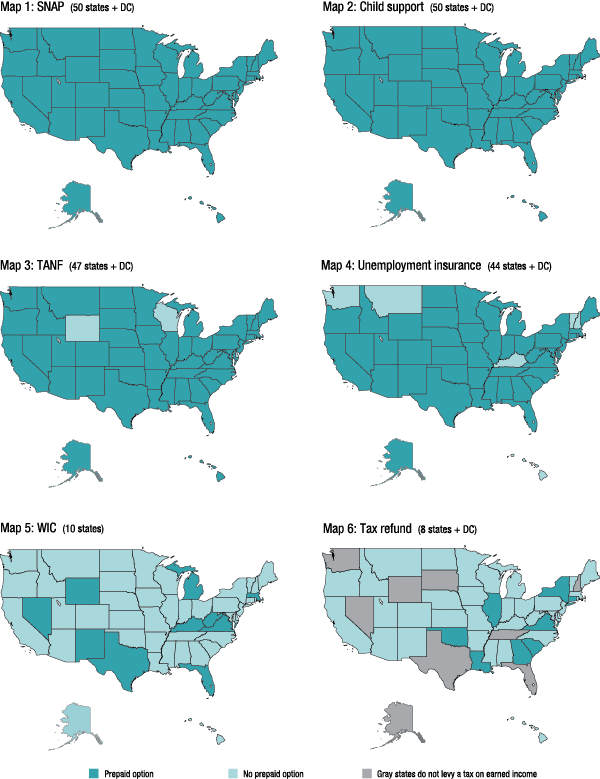Report to the Congress on Government-Administered,
General-Use Prepaid Cards, July 2015
Background
Federal, state, and local government offices use prepaid cards to disburse funds at a lower cost than checks (or other paper-based payment instruments such as vouchers or coupons) and to provide an alternative to direct deposit for payment recipients, especially those recipients who do not have bank accounts. Government offices contract with financial institutions to issue prepaid cards, disburse program funds, and provide customer service.4
Prepaid cards are a ubiquitous disbursement mechanism in the government sector. Today, all states disburse Supplemental Nutritional Assistance Program (SNAP) benefits exclusively through electronic benefit transfer (EBT) cards, and every state offers a prepaid card option for child support programs.5 In addition nearly every state offers a prepaid card option for unemployment insurance and Temporary Assistance for Needy Families (TANF) programs.Maps 1-6 show prepaid card adoption by state across common state government programs.6
A number of government offices now mandate that recipients receive payments electronically, through either a prepaid card or direct deposit. As of March 2013, the U.S. Treasury Department requires all-electronic disbursement of funds under several major federal benefit programs, including Social Security and Veterans Affairs programs.7 In addition, all states are required to replace paper vouchers with an EBT card system for the Women, Infants, and Children (WIC) Supplemental Nutrition Program by October 1, 2020.8 As of May 2015, 10 state WIC agencies have completed the conversion to EBT cards, and most other states are either in the planning or implementation phase of the conversion process.9
References
4. Occasionally, third-party program managers are involved in government prepaid card programs. Issuers often contract with program managers to provide services traditionally carried out by the issuer, for example, call center management and transaction processing. In certain cases, a program manager contracts directly with the government office and provides almost all functions that are traditionally carried out by an issuer. In these instances, the issuer's role is limited to maintaining a Federal Deposit Insurance Corp.-insured bank account for program funds and providing the program manager with a connection to the relevant payment card network. Entities other than depository institutions typically are ineligible to join the Visa and MasterCard networks and use a bank to connect to these networks. Return to text
5. Subsections 1075(b)-(d) of the Dodd-Frank Act amend benefits statutes such that EBT cards issued in connection with the relevant program are not subject to the provisions of section 920 of the EFTA. The amended benefits statutes are the Food and Nutrition Act of 2008, the Farm Security and Rural Investment Act of 2002, and the Child Nutrition Act of 1966. Although EBT cards issued in connection with relevant programs are not subject to section 920 of the EFTA, the Board believes that it is appropriate to include in this report information about such EBT cards because they represent a significant portion of prepaid cards issued pursuant to government-administered programs. Return to text
6. See "Electronic Benefits Transfer (EBT) Status Report by State," U.S. Department of Agriculture (USDA), May 14, 2015, www.fns.usda.gov/sites/default/files/snap/electronic-benefits-transfer-ebt-status-report-state.pdf; "WIC EBT Activity," USDA, accessed May 2015, www.fns.usda.gov/sites/default/files/wic/EBTActivityMap.pdf. Map data based on publically available information from state agency websites and the Food and Nutrition Service. Return to text
7. See 31 CFR 208.3-4. The U.S. Treasury's rule provides for certain limited waivers from the all-electronic requirement. Waivers may be granted to recipients born on or before May 1, 1921, who were receiving payments by check on March 1, 2013. Waivers may also be granted in instances where the requirement would be overly burdensome for the recipient, for example, in cases where the recipient suffers from a mental impairment or resides in a remote geographic location lacking the infrastructure to support electronic financial transactions. Return to text
8. Healthy, Hunger-Free Kids Act of 2010, Pub. L. No. 111-296, § 352(d), 121 Stat. 3183, 3255 (2010). Return to text
9. For more information on states' progress in converting to WIC EBT card systems, see "Women, Infants and Children (WIC), WIC EBT Activities," USDA, accessed May 2015, www.fns.usda.gov/wic/wic-ebt-activities. Return to text

